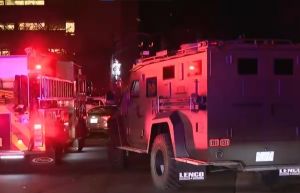Democratic National Committee Chairwoman Debbie Wasserman Schultz said Tuesday that an additional debate in New Hampshire ahead of the early voting state's primary is unlikely to happen, dealing a blow to co-hosts MSNBC and the New Hampshire Union Leader.
"We have no plans to sanction any further debates before the upcoming First in the Nation caucuses and primary, but will reconvene with our campaigns after those two contests to review our schedule," Wasserman Schultz said in a statement, referring to early voting states of Iowa and New Hampshire. "Our three major candidates are already scheduled to appear on the same stage next week for the New Hampshire Democratic Party dinner on February 5th."
The New Hampshire Union Leader announced on Tuesday that it was set to partner with MSNBC to host a Democratic debate on Feb. 4, just five days before the state's primary, according to CNN. Joseph McQuaid, the publisher of the Union Leader, said that it would be the first time in 32 years that the people of New Hampshire would not have a Democratic debate before heading to the polls.
"Our readers have demanded a debate to help them see who is most fit to be the Democratic nominee for President," said Joseph W. McQuaid, president and publisher of the Union Leader, according to the paper. "We were always concerned that this would have been the first time in 32 years without a Democratic debate before the New Hampshire primary. We are glad to partner with MSNBC to ensure Granite Staters have the information they need to make a critical decision on Feb. 9."
All three of the major campaigns reacted positively, although only Martin O'Malley definitively said that he would participate. "Hillary Clinton would be happy to participate in a debate in New Hampshire if the other candidates agree, which would allow the DNC to sanction the debate," Clinton communications director Jennifer Palmieri said, according to The Hill.
The DNC, however, has an exclusivity clause that requires candidates to only participate in sanctioned debates. Those who do not risk being suspended from other Democratic debates.
Wasserman Schultz, who has been under fire for not expanding the debates beyond the six that are on the schedule that has been perceived as an advantage to Clinton, also struck a defensive tone in her statement, saying, “Here are the facts. Democratic debates this cycle have far exceeded the viewership of debates in past competitive primaries. Our October debate in Nevada set a Democratic primary record with 15.8 million viewers, the sixth-biggest non-sport cable broadcast in U.S. history, while our most recent debate on NBC was the third highest-rated debate in Democratic primary history with 12.5 million viewers including broadcast and online streaming."
© 2025 HNGN, All rights reserved. Do not reproduce without permission.








